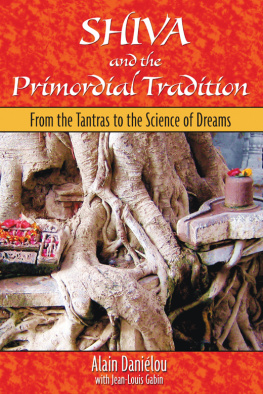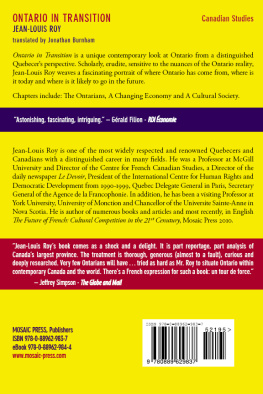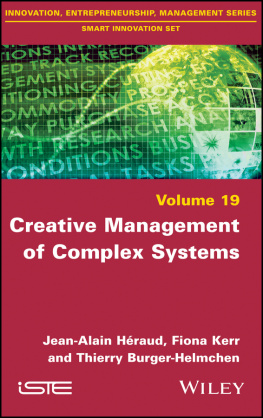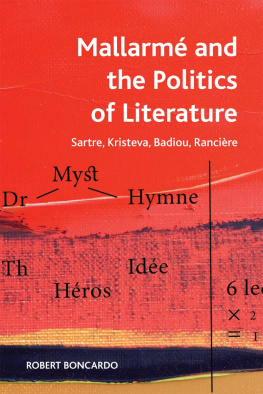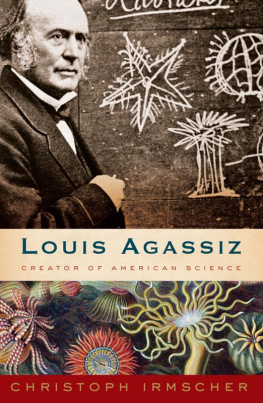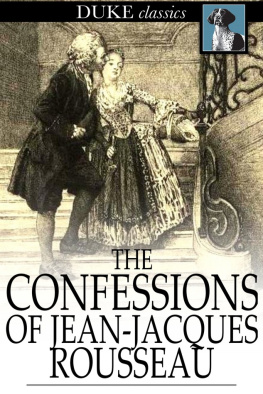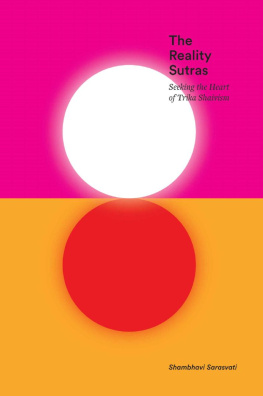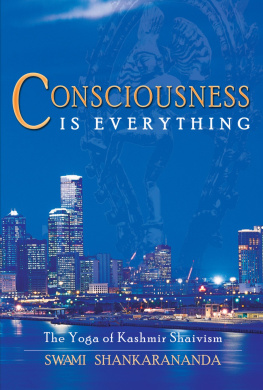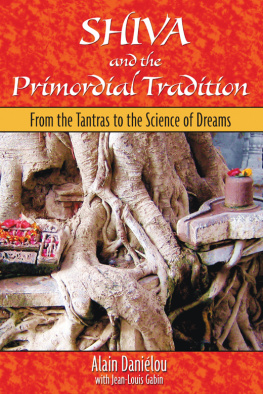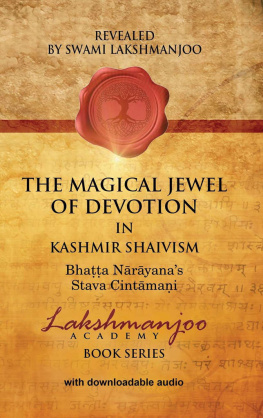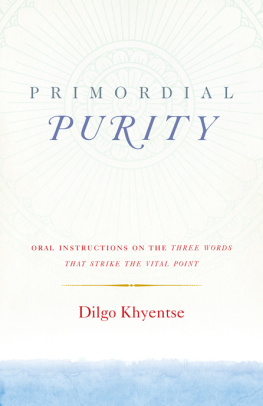
The Linga of Gudimallam, second century C.E. (Photograph copyright the French Institute of Pendicherry, used by permission.)
Shiva
and the
Primordial Tradition
FROM THE TANTRAS TO THE SCIENCE OF DREAMS
Alain Danilou
with Jean-Louis Gabin
Translated from the French by Kenneth F. Hurry

Inner Traditions
Rochester, Vermont

I In a world where everything changes [where nothing
is permanent] the divine is everywhere present [in flowers,
birds, animals, in forests, in man].
IIEnjoy fully what the god concedes to you and never
covet what belongs to others [neither their goods, nor
their talent, nor their success].
ISHA UPANISHAD, TRANSLATED BY ALAIN DANILOU

EDITORS PREFACE
The Ferrymans Task of
Alain Danilou
A n essayist, musicologist, Sanskritist, and philosopher, Alain Danilou was also professor of the Benares Hindu University from 1949 to 1953, honorary member of the Institut Franais dIndologie from 1943 on, Director of the Library of Manuscripts at Adyar in 1954, and member of the cole Franaise dExtrme-Orient from 1956 to 1960, before he became the director of the Institute of Comparative Musicology in Berlin and Venice up to 1977. In 1991, the Ambassador of India in Rome handed him an edict engraved on a copper plate making him the first Westerner to belong to the famous Sangeet Natak Academy. He passed away in 1994 covered with honors: the Lgion dhonneur, Professor Emeritus of the City of Berlin, Commandeur des Arts et des Lettres (at the same time as Ravi Shankar, who dedicated to him the concert he gave on that occasion in Paris at the Thatre des Champs lyses).
Danilou has left behind him an exceptional work, translated and well-known in many countries, both in the field of comparative musicology and the safeguarding of World Music (the title of the collection of records he created for UNESCO), as well as in the field of Indian philosophy and culture. His bibliography includes books that have been classics for many yearssuch as his encyclopedic Hindu Polytheism (republished with the title The Myths and Gods of India); Shiva and Dionysus; Virtue, Success, Pleasure, LiberationThe Four Aims of Life; as well as While the Gods Playworks that have been translated, particularly in the United States, where they have been published by Inner Traditions or in the Bollingen series of Princeton University.
If we add to these texts his scholarly translations in French from seminal Sanskrit and Tamil works, it is strange that his memory was not more honored by the academic world at the time of his death. In this regard, the Encyclopaedia Universalis was fully justified in concluding the long article devoted to him in 1995 with the words, Bewildered by such a multi-faceted approach, university circles have mostly kept Alain Danilou aloof.
What was Alain Danilous approach? It can be summed up in a sentence: For more than fifteen years, he practiced only Sanskrit and Hindi, immersing himself in the traditional society of India and its scholars, which gave him access to commentaries on texts transmitted orally, parallel to official Hinduism.
From this, it is easy to understand how far Danilou was from ordinary university research patterns and, consequently, that what he can teach us is exceptional.
If Danilou had access to texts and commentaries that are neverin traditional societytaught ex cathedra, and still less published, it is because he had no other goal than the research itself and was deemed trustworthy by those circles of traditional scholars and metaphysicians, who are similar to those who disappeared during the Middle Ages in the West and to those who may survive today in Sufi confraternities tolerated by Islam, which the history of mystic poetry tells us were often persecuted.
During his long stay in traditional India, which up to his last days he considered as his true homeland, Danilou gradually acquired rules of life and ways of thinking that are very different from those of the society in which he was born at the beginning of the century. A rite of initiation marked the frontier, the second birth, of this Westerner who descended from one of the oldest families of Europe, related to Shakespeares Dukes of Clamor. As he recounts with great humor in his memoirs, The Way to the Labyrinth, he was the son of a very Catholic mother, founder of a religious order, and an anticlerical father, several times a minister in the French Third Republic. His brother was a famous cardinal and he himself, to use his own expression, was an apostate of some renown, who became assimilated into Hinduism, which does not proselytize and to which, in principle, one does not convert.
Such an adhesion to the object of research is almost unknown in the university approach, set on the critical distance. His adherence can best be understood in the artistic domain, in considering Gauguin and his metaphysical Tahitian universe, which the colonization and the missions of his own time were busy destroying.
Danilous approach relates first and foremost to the traditional quest, which aims at identifying the seeker with the object of his search, orif one prefersof the initiate with knowledge. On several occasions in The Way to the Labyrinth, Danilou writes that in India he sought nothing, neither career, honors, nor powers. Just so, he sought nothing, except to understand a civilization thousands of years old, a traditional society similar to the most brilliant civilizations that are no more, which has remained intact, with its social structures, cults, metaphysical and philosophical systems, its arts, the fresh air of its diversity. As the Upanishads sayand this is something that he often quotedIn all things, leveling means death.
Danilou, who had practiced Western dance and singing at a professional level before arriving in India in the thirties, began by learning Indian music under a traditional master, with whom he communicated in Hindi. Since in traditional Indiaas in Pythagorean thoughtmusic is considered the fundamental key to knowledge, Danilou ended up meeting the scholars and wandering monks who always gather at Benares, the heart of the Hindu world:
After I had learned to speak and write Hindi fairly well, Vijayanand Tripathi, one of the great scholars of Benares, was kind enough to take interest in me and answer the numerous questions I had been asking myself . Every evening, he taught from a raised platform in front of his house to a group of followers from many different castes assembled there. He had been the disciple of a famous Yogi and, besides classical philosophy, rituals, and interpretation of texts, he knew the most secret aspects of Tantric doctrines and Yoga practices. In his public lectures, he explained the episodes and the hidden meanings of the famous Ramayana in Hindi, written by the great poet Tulsi Das.
It did not take me long to discover that this austere scholar had a completely open mind with whom one could discuss not only topics such as human sacrifices, omophagia, and erotic rites, but also the origins of language, cosmology, and Indian theories on the nature of the world, the atom, time, and space .
Next page
